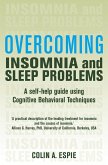Medical Causes of Insomnia
There are many medical conditions (some mild and others more serious) that can lead to insomnia. In some cases, a medical condition itself causes insomnia, while in other cases, symptoms of the condition cause discomfort that can make it difficult for a person to sleep.
Examples of medical conditions that can cause insomnia are:
- Nasal/sinus allergies
- Gastrointestinal problems such as reflux
- Endocrine problems such as hyperthyroidism
- Arthritis
- Asthma
- Neurological conditions such as Parkinson's disease
- Chronic pain
- Low back pain
Medications such as those taken for the common cold and nasal allergies, high blood pressure, heart disease, thyroid disease, birth control, asthma, and depression can also cause insomnia.
In addition, insomnia may be a symptom of underlying sleep disorders. For example, restless legs syndrome-a neurological condition in which a person has an uncomfortable sensation of needing to move his or her legs-can lead to insomnia. Patients with restless legs syndrome typically experience worse symptoms in the later part of the day, during periods of inactivity, and in the transition from wake to sleep, which means that falling asleep and staying asleep can be difficult. An estimated 10 percent of the population has restless legs syndrome.
Sleep apnea is another sleep disorder linked to insomnia. With sleep apnea, a person's airway becomes partially or completely obstructed during sleep, leading to pauses in breathing and a drop in oxygen levels. This causes a person to wake up briefly but repeatedly throughout the night. People with sleep apnea sometimes report experiencing insomnia.
Dieser Download kann aus rechtlichen Gründen nur mit Rechnungsadresse in A, B, CY, CZ, D, DK, EW, E, FIN, F, GR, H, IRL, I, LT, L, LR, M, NL, PL, P, R, S, SLO, SK ausgeliefert werden.









